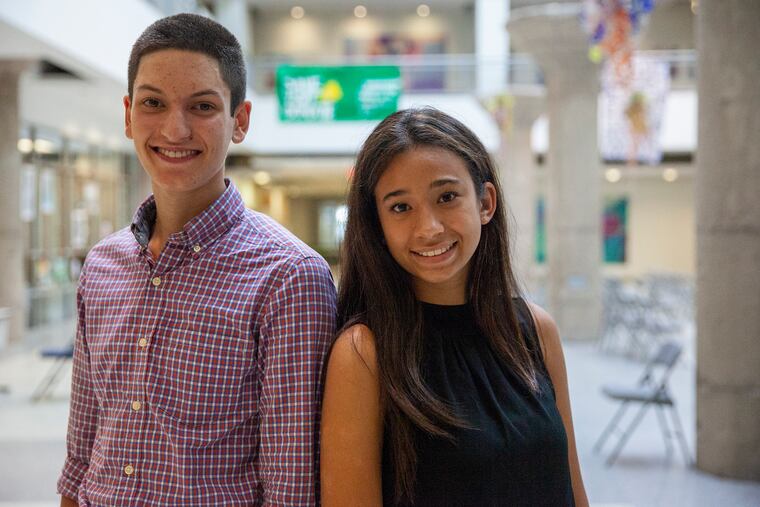After historic term on Philly Board of Education, what did 2 students learn?
Although they said their time on the board filled them with hope, Julia Frank and Alfredo Praticò painted a portrait of a district with uneven opportunities for students.

The first student representatives to the Philadelphia School District’s governing body in a generation have wrapped up their term speaking for 200,000 students, and it’s been an eye-opening year, say Julia Frank and Alfredo Praticò.
After crisscrossing the city talking to young people at schools and in meetings, the two recent high school graduates — Frank from Northeast High and Praticò from Masterman — finished their time on the Board of Education recently, releasing a report with insights and policy recommendations.
What should change
Frank and Praticò urged the board to consider implementing a system of teacher feedback, allowing students a way to anonymously tell teachers how they might improve learning, much like systems in place in colleges and universities.
They also suggested that the board write a policy on class selection. Some schools have clear policies on how to gain admission to Advanced Placement and other selective courses, but in others, students are randomly assigned such classes. “When resources and course offerings are so sparse in schools, we cannot afford to exclude a student when there is a course available to them,” Frank and Praticò wrote.
The student representatives recommended that the board issue guidelines on career preparedness. “The most common issue we heard was that students did not feel prepared for college or career,” they wrote. “We fear that many seniors are graduating in June and entering a world where they have no direction or game plan. A school’s job does not end once grades are submitted or the bell rings. We have a responsibility to give students the ability to seize as many opportunities as possible, and it is apparent that we must do better.”
Although they said their time on the board had filled them with hope, Frank and Praticò’s report painted a portrait of a district with uneven opportunities for students.
At some high schools, students felt prepared for college or career, confident about their resumes, ready to present professionally. At others, their peers told Frank and Praticò they were unsure how to find jobs or use basic word processing programs.
“This is something that we found almost disturbing when we visited certain schools,” Praticò said at an event Thursday. The student board members visited a mix of selective admission, neighborhood, and career and technical high schools.
What worked, what didn’t
In a city with abundant academic supports, internships, and research opportunities for young people, many Philadelphia public school students said they felt shut out from or in the dark about such programs.
And while students at small schools said they generally felt adequately supported by staff, their counterparts at larger schools felt the opposite.
“Students in these schools felt that many of the counselors and staff were not invested in the students, and they expressed feeling uncomfortable speaking to them about personal matters,” Frank and Praticò wrote. “They also felt that they did not receive personalized care because of the large student-to-counselor ratio.”
Frank and Praticò said they talked often with students about where the school system should improve. But they also heard hopeful things, they said.
Students at Parkway Center City Middle College felt lucky to have the chance to take college classes while attending high school. Those at the Workshop School loved their project-based education. Mastery Charter-Gratz students liked the internships and volunteer opportunities embedded in their learning.
And although some students had concerns about teachers, most sang their educators’ praises.
“Students shared so many stories of teachers who would stay after school to provide extra tutoring, teachers who helped students develop a plan for college or a career after high school, teachers who would write short-notice letters of recommendations, or just be a caring pair of ears to support a student in their second home,” Frank and Praticò wrote.
What’s next
Frank is headed to the University of Pittsburgh on a full-tuition scholarship. Praticò will attend the University of Pennsylvania. They were uniformly lauded for their work by board members, Superintendent William R. Hite Jr., and members of the public.
The board is expected to name two new student representatives this summer.
Eighty-four students from district and charter schools have applied to replace Frank and Praticò.